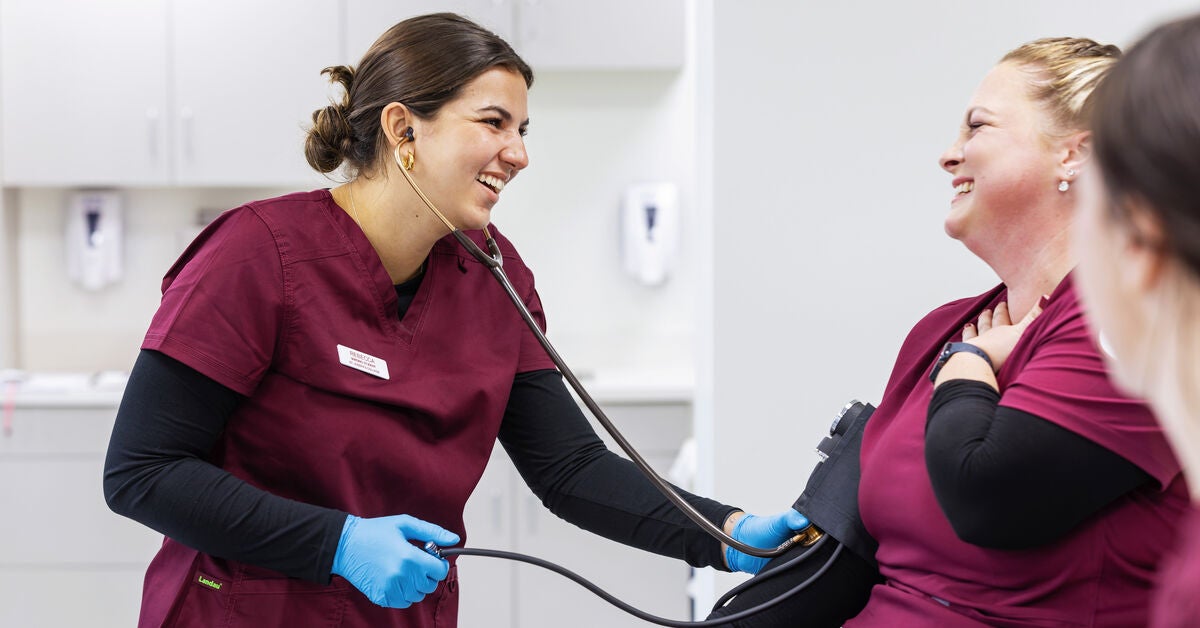How to Become a Registered Nurse in New Hampshire
The U.S. is home to nearly 5 million registered nurses (RNs), making RNs the largest segment of the healthcare workforce. As frontline healthcare providers, RNs make an extraordinary difference in people's lives day in and day out.
Starting your nursing career in New Hampshire has many advantages. Whether you live in the state or are considering moving there, you can build a rewarding career as an RN.
In this blog post, you will learn how to become a registered nurse in New Hampshire. Keep reading to explore the educational and licensure requirements and how to benefit from New Hampshire nursing license reciprocity.
Why Choose New Hampshire for Your Nursing Career?
New Hampshire can be an advantageous place to start your nursing career. RNs have a positive employment outlook, solid earning potential, and flexible job opportunities.
Strong Demand for Nurses
The growing demand for nurses in New Hampshire means RNs have strong employment prospects. New Hampshire Employment Security expects RN employment to grow by 6.7% between 2022 and 2032, faster than the national growth projection of 6%. RN is the sixth fastest-growing job in the state, with an average of 850 job openings annually over the decade.
Competitive Salaries
New Hampshire RNs also earn competitive salaries. Half earn over $89,410 per year. This figure is higher than the national median salary of $86,070.
New Hampshire Nursing License Reciprocity
You may be curious about whether New Hampshire is a compact nursing state. New Hampshire is one of 42 jurisdictions in the Nurse Licensure Compact (NLC), which allows nurses to practice across these areas with one multistate license.
The NLC simplifies obtaining licensure in multiple states, expanding job opportunities for RNs. If you reside in New Hampshire and have a multistate RN license, you could practice in New Hampshire and some surrounding states.
What Are the Educational Requirements for New Hampshire Registered Nurses?
To become an RN in New Hampshire, you must earn a minimum of an Associate Degree in Nursing (ADN) from an accredited nursing program. Nursing programs are accredited by the Accreditation Commission for Education in Nursing (ACEN) and the Commission on Collegiate Nursing Education (CCNE).
Most RNs in the U.S. have a Bachelor of Science in Nursing (BSN). Many healthcare and nursing organizations advocate for the BSN as entry-level nursing preparation because higher levels of nursing education improve patient outcomes. According to the American Association of Colleges of Nursing (AACN), BSN programs prepare nurses to provide quality care through critical thinking, leadership, case management, and health promotion.
Advantages of Earning a BSN
Earning a BSN can also help RNs gain the following advantages in their nursing careers:
- Nurse Licensure: Candidates for the national nurse licensure exam are more likely to pass the first time when they hold a bachelor’s degree. In 2023, the pass rate for first-time candidates with a bachelor’s degree versus an associate degree was approximately 90.2% and 87.8%, respectively.
- Advanced Nursing Education: Most graduate-level nursing programs require candidates to have a BSN. You may consider a BSN if you want to advance your nursing education later and become an advanced practice registered nurse (APRN), nurse administrator, researcher, or educator.
- More Job Opportunities: Both ADN and BSN programs prepare candidates for entry-level nursing practice. However, nurses with a BSN can qualify for more job opportunities because some employers prefer candidates with baccalaureate nursing education.
- Higher Earning Potential: Pursuing baccalaureate nursing education may also boost your earning potential. Nurses with a BSN earn more than those with an ADN in some work settings.
Types of BSN Programs
You have two options for baccalaureate nursing education—a traditional BSN or an accelerated BSN (ABSN). Both will prepare you for entry-level nursing practice.
The program you choose depends on your qualifications and career goals. As you explore your options, consider your educational background and how quickly you want to start your nursing career.
Traditional BSN Programs
Traditional BSN programs are for candidates with a high school diploma. You can graduate with a BSN in approximately four years. The curriculum combines nursing coursework and clinical experiences with humanities, social and basic sciences, business, psychology, and nutrition courses.
If you have an ADN or a diploma in nursing, you can enroll in an RN-BSN program. These programs take into account what you already learned in your ADN program and add to it. The curriculum includes some nursing courses as well as any general education requirements to receive a BSN.
ABSN Programs
If you have a bachelor’s degree in a non-nursing discipline, you can pursue an ABSN program. ABSN programs build on previous baccalaureate education, allowing you to focus on nursing coursework and clinical experiences immediately. ABSN programs are rigorous but faster to complete than traditional BSN programs. Students attend full-time without breaks between semesters.
What Is the Registered Nurse Licensing Process in New Hampshire?
Applying for licensure is the next step in becoming a registered nurse in New Hampshire. New nursing graduates should apply for RN licensure by examination through the state board of nursing (BON). The process involves submitting a licensure application and passing the national nurse licensure exam.
Application for Licensure
The New Hampshire application for RN licensure is available online. You will need to submit several items as part of the application process, including:
- Copy of state-issued driver’s license
- Official transcripts from the nursing program
- Completed criminal background check
- Application fee
NCLEX Examination
To become a licensed RN, you must pass the National Council Licensure Examination (NCLEX). Scored on a pass/fail basis, the exam assesses the knowledge and skills for safe and effective entry-level nursing practice.
Here’s how the NCLEX process works:
- Submit your RN licensure application to the New Hampshire BON, and then register online with Pearson VUE to take the NCLEX. You will pay a registration fee, which is currently $200 for candidates seeking RN licensure in the U.S.
- The New Hampshire BON will review your licensure application and determine whether you can take the NCLEX. If you are eligible, you will receive an authorization to test (ATT) email.
- Schedule your test date via Pearson VUE.
- Prepare for the NCLEX. You can preview the exam on the NCLEX website and use prep courses, practice tests, and review books to prepare as needed.
The New Hampshire BON will receive your exam results and determine whether you qualify for RN licensure. Successful candidates become licensed RNs in New Hampshire.
How to Apply for New Hampshire Nursing License Reciprocity?
You can obtain a multistate nursing license by applying through the BON in your primary state of residence, which must be a compact state. You must meet the NLC uniform licensure requirements regardless of where you live. These include meeting the licensure requirements in your state of residency, passing the NCLEX, and completing state and federal background checks.
Nurses Residing in New Hampshire
Nurses who reside in New Hampshire should obtain their multistate nursing license from the New Hampshire BON:
- New Nursing Graduates: Apply for RN licensure by examination, following the previously outlined steps.
- RNs Moving to New Hampshire with an Out-of-State License: Apply for RN licensure by endorsement within 60 days of relocating.
All applicants must submit the Declaration of Primary State Residency Form.
Nurses Residing Outside of New Hampshire
Nurses who reside in a compact jurisdiction other than New Hampshire and want to practice in New Hampshire should obtain their multistate license from the BON in their primary state of residence. The requirements vary by state; check with the BON for details.
How Long Does It Take to Get a New Hampshire Nursing License?
The time it takes to become a registered nurse in New Hampshire depends on your educational pathway and NCLEX preparation time. Generally, you can become a licensed RN in New Hampshire in approximately 1.5 to 4.5 years.
Educational Timeline
Completing your entry-level nursing education will take one to four years. ABSN programs take 11 to 18 months, allowing you to start your nursing career quickly. You can complete an ADN program in approximately two years and a traditional BSN program in four years.
Licensure Timeline
The licensing period typically takes three to six months:
- Licensure Application and NCLEX Registration: Submit your licensure application and NCLEX registration in as fast as a few days, depending on how quickly you complete the required documentation. Then, receive your NCLEX ATT email in two to four weeks.
- NCLEX Scheduling and Preparation: Schedule your NCLEX test date within the timeframe specified by the BON, which averages 90 days from the ATT email. Prepare for the exam until your scheduled test date.
- NCLEX Testing and Results: On your test day, complete the NCLEX within five hours. The BON will receive your results within six weeks of your test date.
- RN Licensure Approval: Receive your RN license a couple of weeks after the BON obtains your NCLEX results and approves your licensure application.
What Are the Continuing Education Requirements for Licensed Registered Nurses in New Hampshire?
New Hampshire RNs must renew their license every two years through the BON. The renewal process involves completing continuing education and submitting an application.
Continuing education will help you thrive in your nursing career. You must complete at least 30 contact hours in the two years immediately preceding your licensure renewal application. This includes workshops, conferences, lectures, and other opportunities to develop nursing knowledge and skills.
Take the Fast Track to Becoming a Registered Nurse in New Hampshire with Saint Joseph's College of Maine
Starting a nursing career in New Hampshire can be both personally and professionally rewarding. You will make a difference by addressing the rising demand for healthcare services while gaining a bright career outlook.
You can take the first step with Saint Joseph’s College of Maine’s Hybrid Accelerated Bachelor of Science in Nursing. It is designed for students residing in Maine, Massachusetts, New Hampshire, and Vermont with a bachelor's degree in a non-nursing discipline.
Accredited by CCNE, Saint Joe's Hybrid ABSN program will prepare you for entry-level nursing practice in just 15 months. It consists of 100% online coursework, direct patient care clinical hours, and two on-campus immersions. Over 90% of Saint Joe's BSN graduates pass the NCLEX the first time.
Clinical placement services are integrated to help students find local preceptors and clinical sites for their clinical rotation hours. Students also have the support of a dedicated student success advisor from enrollment to graduation.
Are you ready for a career change to nursing? Begin by requesting information about Saint Joe’s Hybrid ABSN program.


